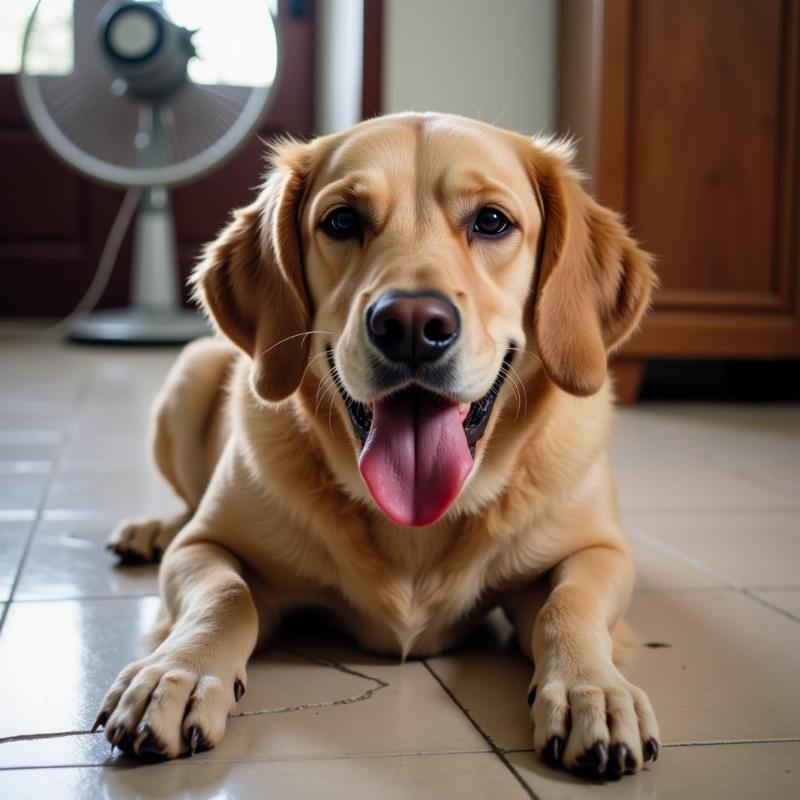Panting is a normal behavior for dogs, a way for them to regulate their body temperature. But if your furry friend is consistently panting at night, it can be concerning. Is it just too warm, or is something else going on? Let’s explore the reasons why your dog keeps panting at night and what you can do to help.
Common Reasons for Nighttime Panting in Dogs
Several factors can contribute to your dog’s nighttime panting. Some are simple to address, while others might require a visit to the veterinarian.
Temperature and Humidity
Perhaps the most obvious reason for panting is overheating. Is your home too warm at night? Remember, dogs don’t sweat like humans, so they rely on panting to cool down. High humidity can also make it harder for dogs to regulate their temperature. Consider using a fan or air conditioning to create a more comfortable sleeping environment. Make sure your dog has access to fresh, cool water throughout the night.
 Dog panting due to heat and humidity
Dog panting due to heat and humidity
Anxiety or Stress
Just like humans, dogs can experience anxiety and stress. Changes in routine, loud noises, or even separation anxiety can manifest as nighttime panting. Try to create a calm and relaxing bedtime routine for your dog. A comfortable bed, a quiet room, and a familiar toy can help ease their anxiety. If the anxiety is severe, consider consulting a veterinarian or a certified dog trainer.
Pain or Discomfort
Panting can be a sign of pain or discomfort. Arthritis, injuries, or even an upset stomach can cause your dog to pant. If you suspect your dog is in pain, schedule a check-up with your veterinarian. Early diagnosis and treatment can significantly improve your dog’s quality of life.
Underlying Medical Conditions
Certain medical conditions, such as heart disease, Cushing’s disease, and respiratory problems, can cause panting. If your dog’s panting is accompanied by other symptoms, such as coughing, lethargy, or loss of appetite, seek veterinary attention immediately. Early intervention is crucial for managing these conditions effectively.
Medications
Some medications can have panting as a side effect. If your dog recently started a new medication and has begun panting excessively, consult your veterinarian. They may be able to adjust the dosage or switch to a different medication.
What Can I Do If My Dog Keeps Panting at Night?
- Check the temperature: Ensure the room is cool and well-ventilated.
- Provide fresh water: Always have a bowl of cool, fresh water available.
- Create a calming environment: Minimize noise and distractions.
- Observe for other symptoms: Note any changes in behavior, appetite, or bathroom habits.
- Consult your veterinarian: If the panting is persistent or accompanied by other symptoms, schedule a veterinary appointment.
When to Seek Veterinary Help
If your dog’s panting is sudden, severe, or accompanied by other symptoms like my dog has diarrhea at night, it’s essential to seek immediate veterinary care.
Conclusion
Nighttime panting in dogs can have various causes, ranging from simple overheating to underlying medical conditions. By observing your dog closely, addressing potential environmental factors, and consulting with your veterinarian, you can determine the cause and ensure your furry friend gets the necessary care. Remember, early intervention is often key to a positive outcome. Don’t ignore persistent panting; it could be a sign that your dog needs help.
FAQ
- Is panting always a sign of a problem? No, panting is a normal way for dogs to cool down. However, persistent panting, especially at night, can indicate an underlying issue.
- How can I tell if my dog is overheating? Signs of overheating include excessive panting, drooling, weakness, and vomiting.
- What should I do if my dog is panting heavily and seems distressed? Contact your veterinarian immediately or take your dog to the nearest emergency animal hospital.
- Can anxiety cause panting in dogs? Yes, anxiety and stress can trigger panting.
- What are some common medical conditions that cause panting? Heart disease, Cushing’s disease, and respiratory problems can all cause panting.
- Should I be concerned if my senior dog is panting more at night? It’s always best to consult a veterinarian about any changes in your senior dog’s behavior, including increased panting.
- Can certain dog breeds be more prone to panting? Brachycephalic breeds (those with short noses, like Bulldogs and Pugs) are more prone to breathing difficulties and panting.
Related Articles
- Why is my dog scratching the carpet
- Dog panting a lot at night
- Dog panting and pacing at night
- Dog coats with legs waterproof
About Beautdogs.us
Beautdogs.us is your premier online resource for all things dog-related in the USA. We offer expert advice on dog breeds, grooming, nutrition, training, health, and overall well-being. Whether you’re a seasoned dog owner or just starting your journey with a new furry companion, Beautdogs.us provides comprehensive, reliable, and engaging content to help you navigate the joys and challenges of dog ownership. For any inquiries, feel free to contact us via email at [email protected] or call us at +1 501-555-7529.